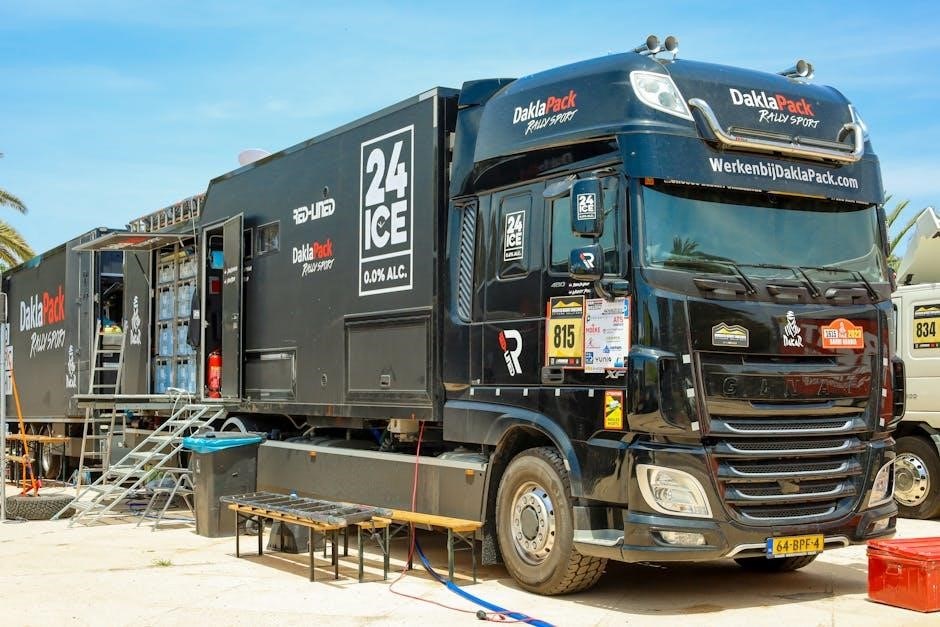Understanding the Trailer Brake System Fault
The Trailer Brake System Fault indicates a malfunction in the trailer brake module, disrupting communication between the vehicle and trailer brakes. It often arises from module failure, wiring issues, or environmental factors like water intrusion. Addressing this fault is crucial for safety and legal compliance, as faulty brakes can lead to accidents and violations. Regular inspections and prompt repairs are essential to maintain towing efficiency and road safety.
The trailer brake system is a critical component designed to control and synchronize braking between a vehicle and its trailer. Located at the rear of the vehicle, it communicates with the trailer’s braking system to ensure safe and efficient towing. The system integrates with the vehicle’s electronics, providing real-time monitoring and control. Its proper function is essential for maintaining stability, preventing accidents, and ensuring legal compliance while towing. Regular maintenance is vital to uphold its performance and reliability.

Common Causes of the Trailer Brake System Fault
Common causes include module failure, relay problems, wiring issues, and corrosion. Environmental factors like water intrusion during rain can also trigger the fault, requiring immediate attention.
Module Failure and Internal Malfunction
The trailer brake module may fail due to internal malfunctions, often caused by wear and tear or environmental exposure. When the module fails, it disrupts communication between the vehicle and trailer brakes, leading to the fault message. Symptoms include inconsistent braking performance and illumination of the fault warning. Internal component degradation can prevent proper signal transmission, necessitating module replacement or repair to restore functionality and ensure safe towing operations.
Relay Problems in the Underhood Fuse Box
Relay issues in the underhood fuse box can cause the trailer brake system fault. A faulty relay may fail to send proper signals to the trailer brakes, leading to system malfunctions; Symptoms include intermittent or complete loss of trailer brake functionality. Inspecting and replacing the relay can often resolve the issue, ensuring reliable communication between the vehicle and trailer braking systems for safe towing operations.

Wiring Issues and Corrosion
Wiring issues and corrosion are common causes of the trailer brake system fault. Damaged or corroded wires can disrupt electrical signals, leading to malfunctioning brakes. Regular inspection of connectors and wires is essential to identify and address problems early. Cleaning corroded connections and replacing damaged wires can restore proper system function, ensuring safe and efficient towing. Addressing these issues promptly prevents further damage and maintains reliable trailer braking performance.
Environmental Factors and Water Intrusion
Environmental factors, such as rain or moisture, can lead to water intrusion in the trailer brake system. Water entering connectors or wiring disrupts electrical signals, causing the trailer brake system fault. Cleaning corroded or wet connectors and ensuring proper sealing can resolve the issue. Regular inspections during wet conditions are crucial to prevent water-related malfunctions and maintain reliable braking performance while towing.

Implications of Ignoring the Fault
Ignoring the trailer brake system fault poses significant safety risks, increasing the likelihood of accidents. It also leads to potential legal consequences due to non-compliance with road safety regulations.
Safety Risks Associated with Faulty Trailer Brakes
Faulty trailer brakes significantly increase the risk of accidents, especially when towing. Loss of braking control can lead to extended stopping distances, trailer sway, and potential detachment, endangering both the driver and other road users. Ignoring this fault can result in reduced vehicle stability and heightened collision risks, making it critical to address the issue promptly to ensure safe towing operations and protect everyone on the road.
Potential Legal Consequences of Neglecting Brake Issues
Neglecting trailer brake system faults can lead to legal consequences, including fines and penalties for non-compliance with road safety regulations. In the event of an accident caused by faulty brakes, drivers may face liability claims and increased insurance costs. Authorities may also revoke driving privileges or impose penalties for operating an unsafe vehicle. Legal action could result in significant financial losses and reputational damage, emphasizing the importance of addressing brake issues promptly.
Troubleshooting the Trailer Brake System Fault
Diagnose the issue by checking fuses, wiring, and connectors for damage or corrosion. Use a compatible scan tool to identify fault codes and guide repairs effectively.
Preliminary Checks and Basic Diagnostic Steps
Start by inspecting the trailer connector for corrosion or damage. Check all wiring connections and fuses under the hood. Ensure the trailer is properly connected and test the brakes manually. If the issue persists, use a scan tool to retrieve fault codes, which can pinpoint specific problems like module failures or relay issues. These steps help identify the root cause efficiently;
Advanced Diagnostic Procedures and Tools
For advanced diagnostics, use a multimeter to test voltage and continuity in the trailer wiring. Employ a scan tool to retrieve detailed fault codes from the Trailer Brake Module (TBM). Inspect the module for internal damage and check the relay in the underhood fuse box. Advanced tools can identify issues like water intrusion or faulty sensors. Consulting repair manuals or manufacturer guidelines ensures accurate troubleshooting and repair of complex system malfunctions.

Specific Issues in Ford Vehicles
Ford F-150 models, particularly 2021 and newer, often experience intermittent trailer brake system faults, even without a trailer connected. Issues stem from software glitches and water intrusion affecting connectors, prompting recalls and updates to resolve the problem effectively.
Trailer Brake System Fault in Ford F-150 Models
The Ford F-150, especially 2021-2023 models, commonly shows the “Trailer Brake System Fault” message, often due to software issues or connector corrosion. This fault can appear even without a trailer connected. Many owners report intermittent alerts during rain or moisture exposure, suggesting water intrusion at the tow connector. Ford has addressed this with recalls and software updates to improve system reliability and communication between the vehicle and trailer brakes, ensuring safer towing operations.
Common Problems in Ford Super Duty Trucks
Ford Super Duty trucks often experience the “Trailer Brake System Fault” due to software glitches or connector issues. Even without a trailer connected, the error may appear, especially during rain, indicating possible water intrusion. Cleaning corroded connectors and updating software can resolve this. Some owners report intermittent dash warnings or sudden fault activations, suggesting wiring or module faults. Ford has issued recalls and technical service bulletins to address these recurring issues, ensuring proper system functionality and safety.
Recall Information and Manufacturer Recommendations
Ford has issued recalls and technical service bulletins addressing the “Trailer Brake System Fault” in certain models. Software updates, such as SSM 52279 for F-150, aim to resolve communication issues between the trailer module and vehicle systems. Manufacturers recommend inspecting connectors for corrosion and ensuring proper wiring connections. Regular maintenance and prompt attention to fault codes are crucial to prevent system malfunctions and ensure safe towing operations. Dealerships can provide specific guidance based on vehicle VINs.

Preventive Maintenance and Best Practices
Regular inspection of trailer brake components, such as connectors and wiring, helps prevent faults. Cleaning corrosion and ensuring secure connections can avoid system malfunctions. Protecting the system from water intrusion and environmental damage is crucial for long-term reliability and safety.
Regular Inspection of Trailer Brake Components
Regular inspection of trailer brake components is essential to prevent faults. Check the trailer brake module, wiring, and connectors for corrosion or damage. Ensure all connections are clean and secure. Inspect the brake pads and rotors for wear. Lubricate moving parts to maintain functionality. Regularly test the trailer brakes to ensure proper operation. Addressing issues early prevents system failures and enhances towing safety. Schedule inspections before each towing trip for optimal performance.
Protecting the System from Environmental Damage
Protecting the trailer brake system from environmental damage is crucial for reliability. Regularly clean and seal connectors to prevent corrosion from moisture. Use waterproof covers for electrical components. Inspect the system after exposure to rain or harsh weather conditions. Ensure all wiring is properly insulated and free from damage. Addressing water intrusion issues promptly prevents malfunctions. Routine maintenance helps safeguard the system from environmental hazards, ensuring consistent performance and safety while towing.

When to Seek Professional Help
Seek professional help if the trailer brake system fault persists despite basic troubleshooting. Persistent error messages or recurring issues require expert diagnosis and repair to ensure safety and functionality.
Recognizing Symptoms That Require Expert Attention
Persistent error messages, intermittent braking issues, or complete loss of trailer brake function are clear indicators for professional help. If basic checks like cleaning connectors or replacing fuses don’t resolve the problem, consult a certified technician. Advanced diagnostic tools may be needed to identify internal module failures or wiring faults, ensuring safety and proper system operation. Ignoring these symptoms can lead to further complications and safety risks.
How to Choose a Reliable Service Provider
When addressing a trailer brake system fault, select a service provider with expertise in towing systems. Look for certified technicians experienced with your vehicle’s make, such as Ford specialists. Check online reviews and ask for referrals to ensure reliability. Compare quotes and warranties, and prioritize dealerships or shops with manufacturer recommendations. A trustworthy provider will diagnose and repair issues efficiently, ensuring your safety on the road.
Addressing the trailer brake system fault promptly ensures safety, prevents legal issues, and maintains towing efficiency. Regular maintenance and professional repairs are essential for reliable performance and compliance.
Importance of Addressing the Trailer Brake System Fault
Addressing the trailer brake system fault is critical for ensuring road safety and legal compliance. Ignoring the issue can lead to accidents, fines, and increased repair costs. Faulty brakes compromise control, especially when towing, risking lives and property. Prompt repairs prevent system deterioration and maintain towing efficiency. Regular inspections and professional attention are vital to avoid escalating problems and ensure reliable performance.
Final Tips for Maintaining a Safe and Efficient Towing Experience
Regularly inspect trailer brake components, connectors, and wiring to prevent corrosion and damage. Ensure proper alignment of the trailer and vehicle for balanced braking. Use high-quality cables and plugs to maintain reliable connections. Monitor system performance during towing and address any unusual behavior promptly. Keep the trailer brake module updated and consult professionals for complex issues. These practices enhance safety, efficiency, and overall towing reliability, minimizing risks and ensuring smooth trips.



